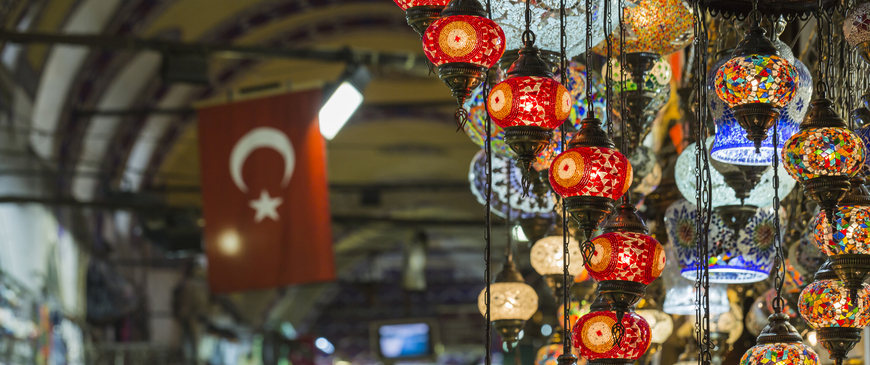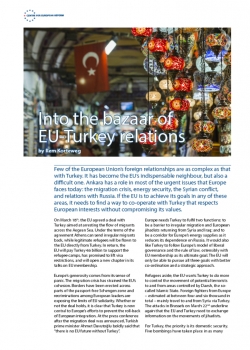
Into the bazaar of EU-Turkey relations
Few of the European Union’s foreign relationships are as complex as that with Turkey. It has become the EU’s indispensable neighbour, but also a difficult one. Ankara has a role in most of the urgent issues that Europe faces today: the migration crisis, energy security, the Syrian conflict, and relations with Russia. If the EU is to achieve its goals in any of these areas, it needs to find a way to co-operate with Turkey that respects European interests without compromising its values.
On March 18th, the EU agreed a deal with Turkey aimed at arresting the flow of migrants across the Aegean Sea. Under the terms of the agreement Athens can send irregular migrants back, while legitimate refugees will be flown to the EU directly from Turkey. In return, the EU will pay Turkey €6 billion to support the refugee camps, has promised to lift visa restrictions, and will open a new chapter in its talks on EU membership.
Europe’s generosity comes from its sense of panic. The migration crisis has strained the EU’s cohesion. Borders have been erected across parts of the passport-free Schengen zone and recriminations among European leaders are exposing the limits of EU solidarity. Whether or not the deal holds, it is clear that Turkey is now central to Europe’s efforts to prevent the roll-back of European integration. At the press conference after the migration deal was announced, Turkish prime minister Ahmet Davutoğlu boldly said that "there is no EU future without Turkey".
Europe needs Turkey to fulfil two functions: to be a barrier to irregular migration and European jihadists returning from Syria and Iraq; and to be a corridor for Europe’s energy supplies as it reduces its dependence on Russia. It would also like Turkey to follow Europe’s model of liberal governance and the rule of law, ostensibly with EU membership as its ultimate goal. The EU will only be able to pursue all three goals with better co-ordination and a strategic approach.
Refugees aside, the EU wants Turkey to do more to control the movement of potential terrorists to and from areas controlled by Daesh, the so-called Islamic State. Foreign fighters from Europe – estimated at between four and six thousand in total – mainly travel to and from Syria via Turkey. The attacks in Brussels on March 22nd underline again that the EU and Turkey need to exchange information on the movements of jihadists.
For Turkey, the priority is its domestic security. Five bombings have taken place in as many months, striking Ankara and Istanbul. The government has blamed Daesh and the PKK, a Kurdish terrorist group. Spill-over from the war in Syria was to be expected; Turkey hosts more than two million Syrian refugees, putting pressure on local services and increasing the footprint of Daesh in Turkey. But Turkish security priorities do not always coincide with Europe’s. Turkey has focused on fighting the PKK at home, and the YPG Kurdish militant group across the border. The Turkish government appears more worried about separatism in its south-east and the possibility that Syria might disintegrate and give birth to a Kurdish state than about the threat from Daesh. By contrast, in European capitals the Kurds are seen as the good guys.
The deteriorating security situation serves as a pretext for President Recep Tayyip Erdoğan to consolidate his power and crack down on domestic opponents, including critical media. Erdoğan’s attempts to change the constitution and strengthen the presidency were stalled by November’s parliamentary elections, which failed to give him the necessary majority. But in its panic over migration, the EU has allowed Erdoğan to get away with repressive moves. While Europe was considering the details of the migration deal, the government in Ankara replaced the board of opposition newspaper Zaman. The timing was no coincidence. Europe’s offer of visa liberalisation without democratic reforms now risks rewarding President Erdoğan’s authoritarian tendencies. In October, the EU delayed releasing a critical report of the human rights situation in Turkey to avoid scuttling an earlier migration deal.
Turkey’s sense of indispensability in the Syrian conflict has complicated the West’s already tense relationship with Russia: when Turkey shot down a Russian jet which violated its airspace in November 2015, NATO members fretted that Turkey’s rash action could drag them into a conflict with Russia. But Europe cannot ignore Turkey’s central role in any settlement of the Syrian conflict, and its aftermath.
Europe also needs Turkey as part of its energy strategy. It wants to diversify away from its dependence on Russian gas imports. Whether it is gas from the Caspian Sea, Kurdish Iraq, Iran, or even from Cyprus’s offshore field, the most straightforward route to the European market is through Turkey. The EU started a high-level energy dialogue with Turkey in March 2015; its main agenda item is moving the Southern Gas Corridor – a project to bring gas from Azerbaijan through Turkey, Greece and Albania to Italy by 2019 – to fruition.
Energy co-operation with Europe is of critical importance to Turkey too, as its relationship with its main gas supplier, Russia, has soured. Turkish gas demand is expected to increase from roughly 50 billion cubic metres (bcm) this year to 70 bcm by 2030, and the country lacks domestic sources. It makes sense for it to work with the EU to develop the necessary infrastructure and attract the extra gas.
Historically, one of the EU’s strongest levers for change in Turkey has been the carrot of accession. When accession talks started in 2005, it coincided with attempts by Erdoğan’s AK Party to weaken the grip of the military on Turkish society; the human rights situation improved for a number of years. But now a weak and divided EU seems to offer little incentive for further reforms. Erdoğan prefers to see himself as a strong regional power, rather than as an EU suitor, and human rights and political freedoms have gone backwards.
One piece of good news is that the Cyprus conflict appears to be inching towards a solution, following a rapprochement between the leaders on the island. The conflict has blocked Turkey’s EU accession talks, effective EU-NATO co-operation and eastern Mediterranean energy plans. But Europe’s anxious bargaining over the migration deal took little account of the delicate negotiations in Cyprus. The EU must show greater awareness of how the different pieces of its Turkey-puzzle fit together.
The EU acts as though it has little leverage, and will have to sacrifice its values for influence in Ankara. But this is too pessimistic. Turkey’s concerns about the potential adverse effects for its economy of the TTIP transatlantic trade talks make it keen to negotiate a free-trade agreement with the US and to update its customs union with the EU. And Russia’s economic sanctions leave Turkey with few options but to boost trade and investment with the EU.
Europe’s market power gives it leverage if it chooses to use it. But it needs to pull together all the strands of its relationship with Turkey. At least six Commissioners and High Representative Federica Mogherini currently cover Turkey policy, with no-one in overall charge. Mogherini should oversee a co-ordination process. As in a bazaar, the EU must know what it wants from Ankara and understand the art of haggling; otherwise, it risks overpaying.
Rem Korteweg is a senior research fellow at the Centre for European Reform.

